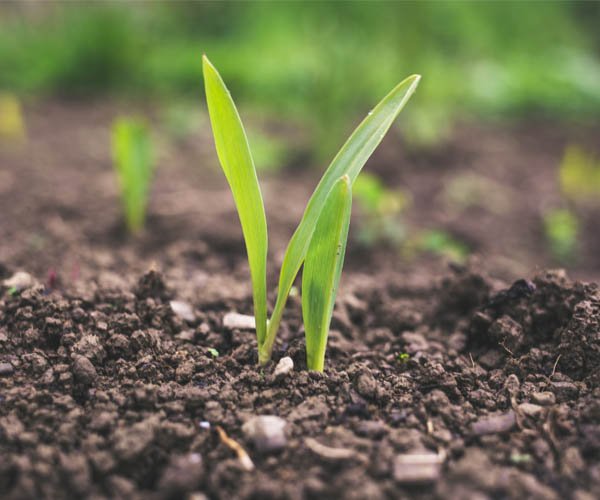Potassium Fulvate is a black powdery substance soluble in water. It is a plant growth regulator, which can promote plant growth, play an important role in drought resistance, improve plant stress resistance, increase yield and improve quality. The main application objects are wheat, corn, sweet potato, millet, rice, cotton, peanut, rapeseed, tobacco, sericulture, melon and fruit, vegetables, etc.
Eight effects of potassium fulvate in agriculture:
1. Water retention
1. Water retention
Mineral Potassium Fulvic Acid is a colloidal organic matter. It can loosen the soil, absorb a lot of water, ventilate and humidify, moisturize water, and prevent drought. Therefore, it can make the soil have good water, air and heat conditions. These advantages are suitable for seed germination and planting.
2. Potassium fulvate can improve saline-alkali land
Potassium fulvate has a small molecular weight and high activity. So it can absorb harmful cations in the soil. Thereby it can reduce the concentration of salt in the soil, reduce the harm of salt to seeds and seedlings, and improve saline-alkali land.
3. Drought and cold resistance
- Mineral source potassium fulvate is sprayed on plant leaves, which can close the stomata of plants and reduce plant water transpiration.
- Mineral source potassium fulvate has a deep color. It is beneficial to absorb solar energy. It will release heat when it is decomposed by microorganisms, which can increase the ground temperature and thus play a role in cold resistance.
4. Resistance to pests and diseases
It can increase the activity of enzymes in plants and increase the resistance of plant organisms.
5. Anti-heavy metal pollution
It participates in the ion exchange reaction in the soil, absorbs and fixes the heavy metal ions in the soil. And it can prevent them from entering the biological cycle.
6. Potassium fulvate can improve fertilizer efficiency
- Nitrogen fixation: When nitrogen into the soil, it is easy to volatilize into the atmosphere or flow into rivers with water and soil loss. Mineral source potassium fulvate can absorb nitrogen in the soil, reduce its volatilization and loss, and improve the utilization rate.
- Phosphorus solution: When phosphorus into the soil, it is easily fixed by the soil. Potassium fulvate from mineral sources can liberate phosphorus from the soil through chelation with phosphorus, so that can be absorbed by plants and improve the utilization rate of phosphorus.
- Activated potassium: most of the potassium applied to the soil exists in the form of potassium salt. Crops cannot directly absorbe the potassium. Potassium fulvate from mineral sources can convert insoluble potassium into soluble potassium through ion exchange function, increase available potassium in soil, and improve potassium utilization rate.
- Micro-fertilizer: Potassium fulvate from mineral sources can undergo a chelation reaction with insoluble trace elements to form a humic acid trace element chelate with good solubility. and crop can absorbe directly. It is conducive to the absorption of trace elements by roots and leaves.
7. Promote the growth and development of crops.
- Can stimulate root growth, and ultimately lead to a great increase in the ability of crops to absorb water and nutrients
- The stimulating effect of mineral source potassium fulvate can make the vegetative body of the aboveground part of the plant grow vigorously. It is manifested in plant height, stem thickness, leaf thickness, etc.
- It has good effects on tillering and reducing the empty grain rate. And can increase the thousand-grain weight of grain and increase grain yield.
8. Potassium fulvate can adjust soil pH
It has more functional groups. So that it can combine with acid and alkali, and can adjust the pH of the soil according to the needs of crops.
Five functions of potassium fulvate in agriculture:
1. Promote the development of crop root system and increase the germination rate.
Potassium fulvate is rich in a variety of nutrients, new roots come out within 3-7 days of use. And at the same time a large number of secondary roots are increased. That can quickly improve the ability of plants to absorb nutrients and water, promotes cell division, and accelerates crop growth.
2. Improve the utilization rate of fertilizer.
Potassium fulvate provides the necessary carbon and nitrogen sources for beneficial microbial activities in the soil. Thereby it can promote the proliferation of microorganisms, decomposing phosphorus, potassium, and fixing nitrogen. So than can greatly improve the utilization rate of nitrogen, phosphorus, and potassium.
3. Improve the ability of plants to resist drought, cold and disease.
It can promote the formation of soil aggregate structure. It also can enhance soil fertilizer and water retention capacity, and enhance the drought resistance of plants. Potassium fulvate can enhance the photosynthesis of plants, increase the organic matter in the plant cell fluid, thereby it can improe the cold resistance of crops. The root system of the plant is developed, the ability to absorb nutrients and water is greatly enhanced. So the plant itself and disease resistance will be stronger.
4. Potassium fulvat can increase output and improve quality.
Potassium fulvate is fully water-soluble, easy to absorb, and has strong permeability. The effect is more than 10 times that of ordinary humic acid. The active substance of fulvic acid can improve the absorption and utilization rate of nitrogen, phosphorus, and potassium. So it can greatly enhance the nutrition of plants themselves, increase production, and improve crop quality.
5. Improve soil and resist heavy cropping.
Fulvic acid combines with calcium ions in the soil to form a stable aggregate structure. The water, fertilizer, air, and heat conditions of the soil can be mediated, the beneficial bacteria in the soil can multiply, and the harmful bacteria in the soil can be controlled, thereby improving crop resistance. It has an obvious repair function for the compaction and soil salinity caused by long-term excessive fertilization.


